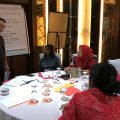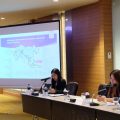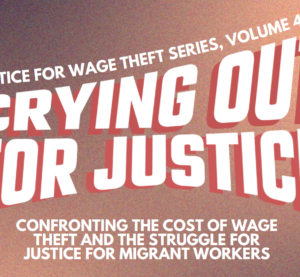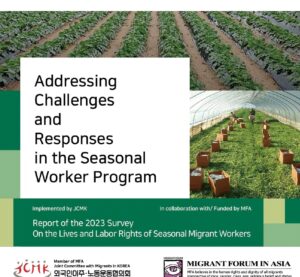National Consultation on Migration and Development 2009
— August 17, 2009Migrant Forum in Asia (MFA) together with the National Legal Aid Agency organized a national consultation on migration and development on 13-14 August 2009 at the Hanoi, International Convention Center, Hanoi, Vietnam. The consultation was attended by 50 participants from CSOs, trade unions, legal aid agencies, government ministries and the media. Aside from local Vietnamese participants, a representative of MFA member in Taiwan, Province of China, the Hope Workers Center, participated in the program. The consultation aimed to bring together key migration and development organizations, NGOs, networks, advocates and civil society groups along with relevant government officials and private sector representatives who have demonstrated strong corporate responsibility practices at the country level, throughout the Asian region, to coordinate and jointly strategize efforts relating to the 3rd GFMD in Athens, Greece on 2-5 November 2009. It also aimed to strengthen advocacy around country-specific migrant policy initiatives, such as the ratification and implementation into national law of the 1990 UN Convention on the Rights of Migrant Workers and Members of their families (UN 1990 MWC).
The Vietnamese Government participated in the first GFMD in Brussels, Belgium as well as the second GFMD in Manila, Philippines. Representatives from the Ministry of Foreign Affairs (MOFA) who participated in the second GFMD were also present in the consultation.
The first session provided an overview of Vietnamese labour migration. The speakers in the session included: Mr. Nguyen Thanh Thuy, Head of the International Migration Division, Consular Department, MOFA and Mr. Nguyen Xuan Tao, Vice Head of the Labour Management Division -Overseas Employment Department of the Ministry of Labour Invalids and Social Affairs (MOLISA), Ms. Ta Thi Minh Ly, Director of the National Legal Aid Agency. A brief history of labour migration from Vietnam was presented. The first period prior to 1975 saw Vietnamese workers migrating to Socialist countries. This was followed by the second period (1975-1980’s) involving the flows of people from South of Vietnam after the country was unified. The third period covers the 1990’s and until the present where the government used migration as a means to address poverty; deploying Vietnamese workers to around 40 countries. According to the data of the MOFA, there are currently around 3.2 million Vietnamese living outside of the country. It was emphasized in the session that there are existing policies on migration but the implementation of these policies are problematic. It was also highlighted that there is lack cooperation among the various ministries dealing with migration.
The second session involved discussions on the specific situations of Migrant workers in the different provinces of Vietnam: Tuyen Quang, Hai Duong and Thai Binh. Speakers in the session were Mr. Ma Xuan Dong, the vice director of the Justice Department in Tuyen Quang Province and Mr. Le Can Ban, director of the Legal Aid Center in Thai Binh Province. Among the issues highlighted include: illegal recruitment, falsification of contracts, contract substitution, non payment and underpayment of salaries, lack of support from embassies and consulates on-site. Among the biggest perpetrators of abuse are the intermediaries: brokers and recruitment agencies. Highlighted as well in session was the lack of information provided to migrant workers upon departure. It was also emphasized that there is lack of support for the reintegration of migrant workers.
In line with the second session, the MOLISSA and the Legal Aid Agency as presented on responses to the issues faces by migrant workers. Speakers were; Ms. Minh Ly of the National Legal Aid Agency and Mr. Tran Thang Loi, Department of Jobs , MOLISA. Interventions on legal aid include: provisions for legal aid including legal aid counseling for migrants and families in and mobile legal aid centers in remote villages. Interventions of MOLISSA on the other hand include: facilitating the deployment of migrants, looking for markets abroad, regulating agencies as well as facilitating the return of migrants who were affected by the economic crisis.
The third session discussed the programs and various support mechanisms for the reintegration of migrant workers. Speakers for the session was Ms. Hoang Kim Ngoc, Vice head of Overseas Employment Management Department, MOLISA. Existing government programs under MOLISA include: provisions for skills training for those who would like to look for jobs in Vietnam and courses in starting a business. It was however noted that these initiatives were only recently implemented and was created as a response to the recession brought about by the economic crisis. A call for more efficient programs and sustainable reintegration socio-economic reintegration programs were raised by the participants.
The fourth and last sessions focused on the issues of women migrant workers and Ms. Nguyen Thi Bac, the chairperson of the Women’s Union in Bac Giang Province. She discussed the issues faced by women migrant: lack of information on the country of destination, contract substitution, abuse in the workplace, non payment and underpayment of salaries, and difficulties in reintegration. She also highlighted the social cost of migration in particular the impact of migration on children.
The issued presented in the consultation highlighted that migration is not a sustainable solution to the economic issues of a country. This is strongly supported by the number of migrants sent home due to the economic crisis and the cases of abuses presented by the speakers. Participants of the consultation made also specific recommendations in order to address the issues faced by Vietnamese migrants and among these include:
- Job generation in the country so people will not be forced to migrate
- Strengthen cooperation among government ministries in order to provide better programs for migrant workers
- Stricter regulation of recruitment agencies
- Provisions for an extensive pre-departure training program for migrant workers
- Strengthen the implementation and monitoring of government programs for migrants
- Strengthen services for migrants in consulates and embassies in countries of destination
- Bilateral agreements that protect the rights and well being of migrant workers
- Create sustainable socio-economic reintegration for migrant workers
- Strengthen networking and partnerships among stakeholders (migrant organizations, CSOs, trade unions, government ministries and regional organizations) to address the issues of migrant workers
- Creation of a regional network for legal aid for migrant workers
- Provisions for legal aid in countries of destination
_________________________
Prepared by the MFA Secretariat
www.mfasia.org





